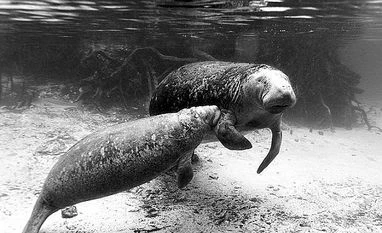About 50 million years ago, dog-like mammals returned to the seas, eventually evolving into whales and dolphins. Around then, too, an early cousin of elephants took the plunge, giving rise to manatees and dugongs.
About 20 million years later, bearlike mammals also waded back into the sea, evolving into seals, sea lions and walruses.
Each of these marine species adapted to the aquatic life in its own way. Manatees and dugongs slowly graze on sea grass. Seals and their relatives dive deep underwater after prey, but still haul themselves onto beaches to mate and rear pups.
Whales and dolphins have made the most radical adaptations, including blowholes, baleen and echolocation.
But a study published on Thursday reveals a common bond: In all three groups of mammals, many species stopped making the same enzyme. Now that loss may come back to haunt them.
The enzyme provides an essential defence against certain kinds of harmful pesticides. The new study raises the possibility that marine mammals may be particularly vulnerable to these chemicals, which are carried from farm fields into coastal waters.
“It’s too important not to pay attention to,” said Nathan L Clark, a co-author of the new study and an evolutionary biologist at the University of Pittsburgh.
Charles Darwin was the first to recognise that marine mammals evolved from ancestors on land. The clues were in their anatomy: Seal flippers are just modified feet. The whale’s blowhole is a nose that has migrated.
More recently, the DNA of marine mammals has revealed more details about their adaptations. Some genes evolved to do new things, but others simply stopped working, scientists have found.
Clark and his colleagues recently developed a new way to search for these genes and looked for those more likely to be broken in marine mammals than in terrestrial ones. The scientists ended up with a short list of genes that were repeatedly shut down in marine mammals.
Most were involved in smelling, which supported earlier studies showing that marine mammals have little or no sense of smell.
But at the top of the list was a gene that had nothing to do with smell, called PON1.
Wynn K Meyer, a postdoctoral researcher at the University of Pittsburgh and co-author of the new study, said she was taken aback when she found out what the gene is best known for: a defence against some toxic chemicals.
These chemicals are called organophosphates, a class of compounds that includes certain pesticides as well as nerve agents like sarin gas.
PON1 encodes an enzyme called paraoxonase that can quickly break down organophosphates. Mice genetically engineered without paraoxonase die quickly when they’re exposed to the chemicals.
Meyer and her colleagues found that all marine mammals have broken copies of the PON1 gene, with a few exceptions: walruses, fur seals and spotted seals.
To see if the gene were truly kaput, the researchers gathered blood plasma from a range of mammal species. They then added pesticides to the plasma.
The plasma from land mammals quickly broke down the chemicals. But plasma from dolphins, manatees, sea lions and elephant seals failed to clear the pesticides.
Mammals didn’t evolve the paraoxonase enzyme to fight the pesticides humans have invented over the past century. After all, the animals have had the adaptation for millions of years.
But paraoxonase breaks down other harmful molecules that our own bodies naturally produce. These oxygen-bearing molecules can damage our cells, causing a variety of problems like a buildup of plaque on the walls of blood vessels.
People who make low levels of paraoxonase run a greater risk of atherosclerosis and heart disease.
So why did marine mammals lose such an important gene? One possibility is that their bodies abandoned paraoxonase when they started taking long dives.
In preparation, the animals suck in tremendous amounts of oxygen, which may create a lot of damaging oxygen-bearing molecules.
Marine mammals may have evolved a new, more powerful way to defend against oxygen-bearing molecules, making PON1 unnecessary, Meyer and her colleagues speculated.
© 2018 The New York Times News Service
The enzyme provides an essential defence against certain kinds of harmful pesticides
Unlock 30+ premium stories daily hand-picked by our editors, across devices on browser and app.
Pick your 5 favourite companies, get a daily email with all news updates on them.
Full access to our intuitive epaper - clip, save, share articles from any device; newspaper archives from 2006.
Preferential invites to Business Standard events.
Curated newsletters on markets, personal finance, policy & politics, start-ups, technology, and more.
)